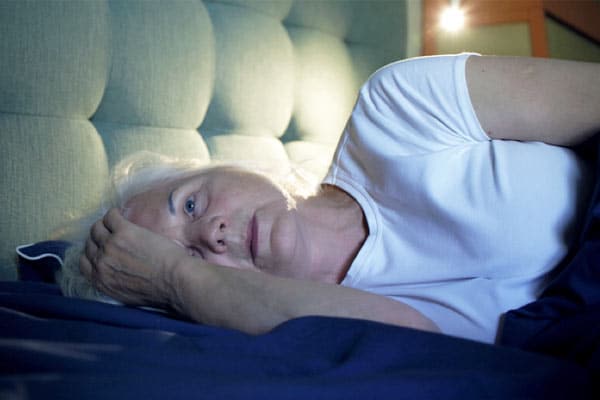After a busy day, there’s nothing like climbing into bed for a restful night’s sleep. But for millions of older adults, sleep is elusive. They may find it difficult to fall asleep or to stay asleep. A variety of factors can impact a person’s quality of sleep, especially as a person ages.
At American, Advocate, and Whitsmys In-Home Care, we know how important a good night’s sleep is for people of all ages. Poor sleep can impact a person’s quality of life. For older adults, it’s common to experience changes in the duration and quality of sleep.
What Are Some Common Sleep Disturbances in Older Adults?
Researchers have found that older adults’ sleep can be impacted by a variety of factors, including:
- Health conditions. Physical and mental health can impact a person’s ability to have restful sleep. Conditions such as anxiety, depression, diabetes, and heart disease commonly impact sleep quality and quantity.
- Lifestyle changes. Stress, retirement, or other lifestyle changes may impact a person’s regular sleep-wake schedule. This can lead to insomnia or difficulties falling asleep.
- Waking up at night. Research has shown that as people age, they often experience a change in how they cycle through the different stages of sleep. These shifts can contribute to more frequent waking and fragmented, less restful sleep.
- Daytime napping. Extended napping, especially later in the day, can make it difficult to fall asleep at night.
- Shifting sleep schedules. As people age, their circadian rhythms shift forward. This may mean that a person is tired earlier in the afternoon and wakes earlier in the morning.
- Pain. Discomfort and pain may interfere with sleep, making deep, restful sleep impossible because pain keeps the person awake.
- Sleep apnea. Sleep apnea is a condition where breathing repeatedly stops and starts. It causes fragmented sleep and can make a person feel exhausted, even after a full night’s sleep. If a person snores, it’s important to see a doctor in order to rule out sleep apnea.
- Insomnia. Difficulty falling and staying asleep is a common issue for many people. Insomnia can be caused by various reasons and can improve with treatment.
- Restless Leg Syndrome (RLS). Impacting up to 20% of older adults, RLS is defined by an urge to move the legs while resting or sleeping.
- REM Sleep Behavior Disorder (RBD). Primarily affecting older adults, RBD can cause people to physically act out their dreams, sometimes violently.
- Nighttime urination. As people age, their urinary system often changes, causing an increased urge to urinate frequently at night.
- Tips to Improve Sleep for Older Adults While some common sleep disturbances in older adults require intervention from a physician, several steps can be implemented at home to improve the quality of sleep. By making lifestyle and environmental changes and establishing good sleep hygiene habits, it’s possible to achieve restful, quality sleep.
- Avoid food and beverages that discourage sleep. Tobacco, caffeine, alcohol, and large meals late in the day can interfere with sleep. Reduce caffeine intake, eat at least four hours before bedtime, and work on a smoking cessation program with the doctor.
- Exercise. Regular exercise helps people fall asleep faster, sleep longer, and achieve better quality sleep. Exercise also provides a number of other benefits and improved overall health.
- Develop a bedtime routine. Engage in activities that are relaxing before bed. Consider taking a warm bath or shower, reading, listening to soothing music, meditation, or prayer.
- Reduce bedtime distractions. Smartphones, bright lights, and televisions are all distractions that make it more challenging to fall asleep. Move electronics out of the bedroom and designate that space for sleeping only.
- Implement a consistent sleep schedule. Designate a specific time to go to bed and to wake up each day and maintain that schedule every day, even on weekends.
In-Home Care Services Can Help!
Frequently, older adults, especially if they live alone, may lack a routine and regular engagement opportunities, making sleep difficult during normal nighttime hours. The trusted referred care providers from American, Advocate, or Whitsyms In-Home Care can help by providing friendly companionship, transportation to social activities, nutritious meals, encouragement for physician-approved exercise, and more. Referred care providers can also take the night shift if a person has difficulty sleeping, providing family caregivers with respite and the needed sleep.
Contact us any time to learn more about the in-home care services Florida families have trusted since 1992 by clicking the link to the location nearest you below:
- American In-Home Care – Serving North, Central, and West Coast of Florida
- Advocate In-Home Care – Serving Southeast and Southwest Florida
- Whitsyms In-Home Care – Serving Southeast and Southwest Florida
State of Florida License and Registration Numbers: 30211518, 30211651, 30211295, 30211390, 30210978, 30211293, 30211382, 30211504, 30211733, 30211535, 30211531, 30211710, 30211709, 30211045, 5661


